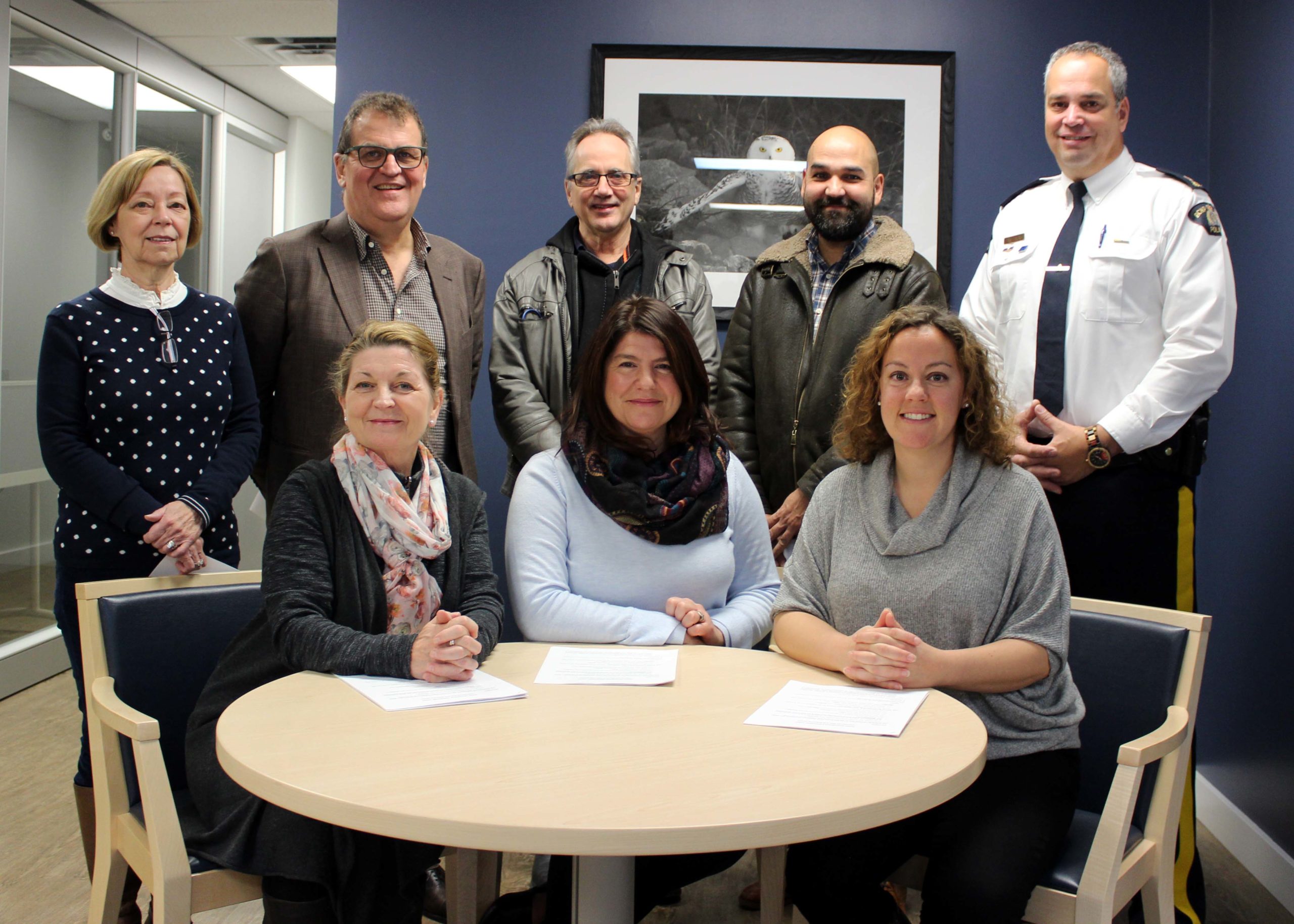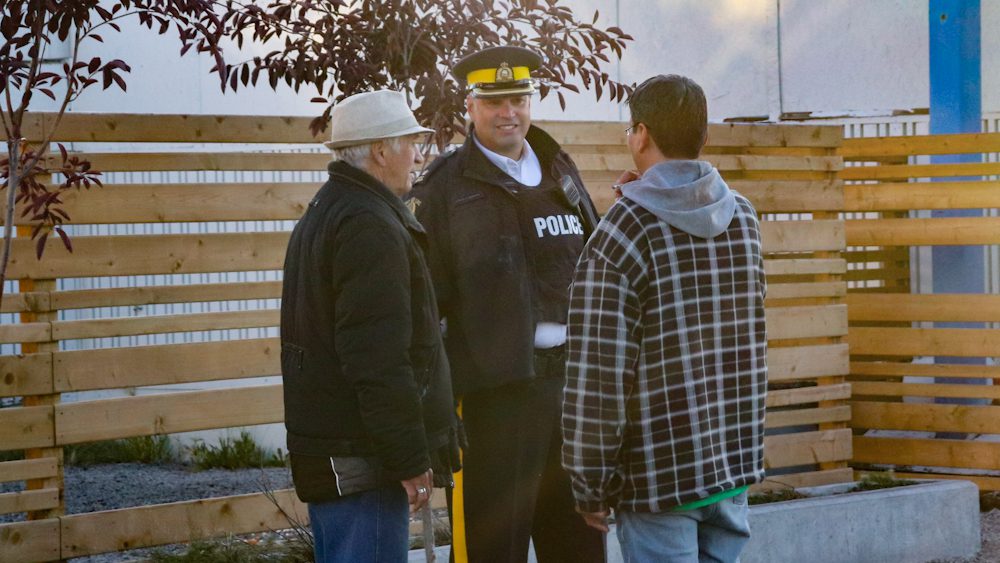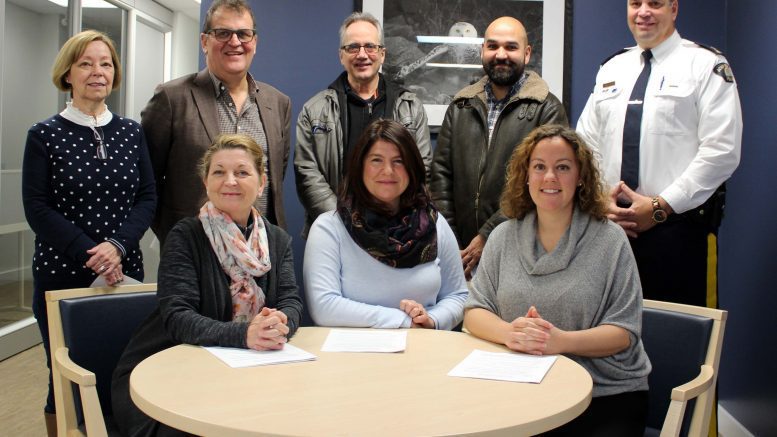
The Good Neighbour signatories are from left to right; Standing: Terry Hawkins (Board Chair, NWT Disabilities Council), John Williston (Neighbour), Bruce Valpy (Neighbour), Martin Goldney (Deputy Minister, Justice), Insp. Alexandre Laporte (RCMP); Seated: Sue Cullen (CEO, NTHSSA), April Desjarlais (Neighbour), Rebecca Alty (Mayor, City of Yellowknife).
The Northwest Territories Disability Council will continue to run the Yellowknife Day Shelter and Sobering Centre in the city’s downtown.
The NWT’s Health and Social Services Authority (NTHSSA) announced Friday that the disabilities council is the successful proponent after a request for proposals seeking bids for an operator for the joint facility.
Officials say the contract is for three years and the facility has an annual operating budget of $2,615,000.
In a news release, NTHSSA states that the sobering and day centre have become a central part of efforts to address homelessness and addictions issues in the downtown core of Yellowknife.
It’s been open at its current site since last fall.
This service has helped hundreds of individuals who have accessed services thousands of times in the first year of operations of the combined centre, the release states.
GNWT officials state this work has not been without challenges and in order to address ongoing issues a regular group of partners including the NTHSSA, the NWT Disabilities Council, the City of Yellowknife and the RCMP have had regular meetings with a core group of neighbours to understand how this service can be improved.
The agreement follow the tragic fatal beating of Mark Poodlat, 36, who died after an attack in front of the sobering centre in August.
The vicious attack was captured on a closed circuit security camera positioned across the street.
Victor Ugyuk, 32, is charged with second-degree murder in Poodlat’s death.

Insp. Alex LaPorte conducts a foot patrol at the sobering centre on Sept. 26, 2019
(CKLB file photo)
Clearly, no one is blaming the operators of the sobering centre or the neighbours for the fatal beating.
However, after the alleged homicide, at least one city councillor has called for an increased RCMP foot patrol presence at or near the centre.
Some residents have said the centre on 50 St. is simply too close to the liquor store on 49 St.
The NTHSSA states that at the renewal of the contract for operations of the centre a Good Neighbour Agreement will be implemented that will formalize this partnership and provide a continued venue for collaboration.
Sue Cullen, Chief Executive Officer of NTHSSA, says she wants to recognize their partners and the group of neighbours who have dedicated much time, thought and advocacy to get us to this point.
“Ensuring we build a partnership that allows us to collaborate and make improvements to this program is a critical factor in our success. This is important work and I believe that as we continue to improve this program and layer on additional services we will continue to make a positive impact in the daily lives of some of our territories most vulnerable residents,” Cullen states.
While the facility operator agreement was signed the NTHSSA also announced the signing of a Good Neighbour Agreement (GNA).
It states organizations that are parties to the Good Neighbour Agreement are to participate in good faith in the functioning and maintenance of the GNA.
They include the Yellowknife day shelter/sobering centre, the owners of the Finn Hansen Building beside the centre and any other businesses and neighbours living around the centre that wish to be part of the agreement.
Also signing on are the Northwest Territories Health and Social Services Authority (the funder), The City of Yellowknife, RCMP, the disabilities council and the NWT Department of Justice.
The release states that other organizations may choose to become engaged in the process with mutual agreement of all GNA members:
They include the Arctic Indigenous Wellness Foundation, The Yellowknife Women’s Society
and members of/or the Client Advisory Committee of the facility as a whole.
The mandate of the Good Neighbours Agreement (GNA)is listed below:
1. Vision
The Facility is supported by the community and perceived as a positive contribution to the downtown core of Yellowknife.
2. Purpose
It is agreed that the purpose of this Agreement is to:
(a) Create a process of ongoing positive communication between all parties listed toward a harmonious approach to addressing both public and client needs with the goal of harm reduction. Harm reduction incorporates a spectrum of strategies for safer use, to managed use, to abstinence, to meet drug and alcohol users ‘where they are at’. It recognizes that the realities of poverty, class, racism, social isolation, past trauma, sex-based discrimination and other social inequalities affect both people’s vulnerability to and capacity for effectively dealing with drug related harm, but does not attempt to minimize or ignore the real and tragic harm and danger, to the individual and others, associated with chronic alcoholism and illicit drug use;
(b) Proactively identify and address potential crime and nuisance issues within the neighbourhood and direct vicinity of the Facility; and
(c) Promote the safety and liveability of the businesses and neighbourhood in the vicinity of the Facility.
All parties to the Agreement acknowledge that the Operator has established operational policies for the Facility.
3. Areas of Focus
Property: It is desirable for property owners and residents to show pride in the community by caring for their property and public spaces in order to maintain the property value.
Safety: Safety and security are essential for citizens to live peacefully and free from harm, and for neighbourhoods to remain desirable and attractive. All of the participants in the GNA share equal responsibility of promoting a safe and secure neighbourhood.
Conduct and behaviour: Conduct and behaviour that is respectful of others contributes to the peaceful enjoyment of life in the community. Clients have the right to act as they please, so long as those actions are lawful, and do not harm others or infringe upon their rights. Cooperation and respect between citizens are desirable qualities, and will be actively promoted in the neighbourhood.
Inherent in this Agreement is the acknowledgement of “Basic Rights” which include the following:
• All residents, businesses, agencies and property owners in the vicinity of the facility (Neighbours), clients and facility staff have the right to personal safety;
• All neighbours, clients and facility staff have a right to quiet enjoyment of their properties and public spaces; and
• Parties to the agreement specifically support the rights of clients to be safe, to access services and to meet their basic needs.
John has been in the broadcast journalism industry since the 1980s. He has been a reporter in Yellowknife since 2012 and joined CKLB in January of 2018.
John covers the crime and court beat as well as reporting on other areas including politics, business, entertainment and sports.
He won seven national community newspaper awards while he was a journalist with Northern News Services Limited (NNSL).
John worked in Ontario before coming North including stints as a TV sportscaster in Peterborough and senior news writer for CBC and CTV in downtown Toronto.









